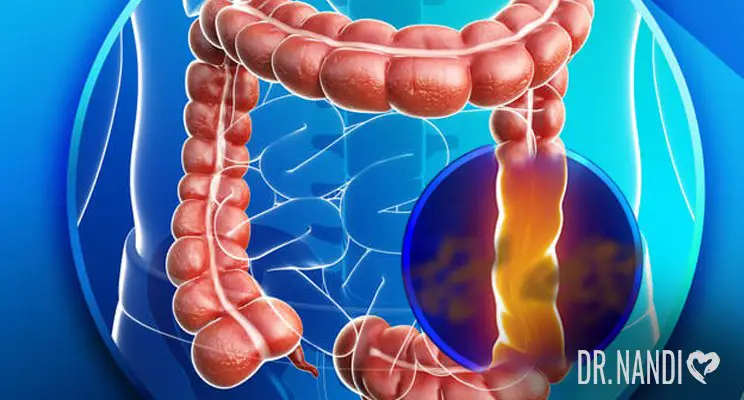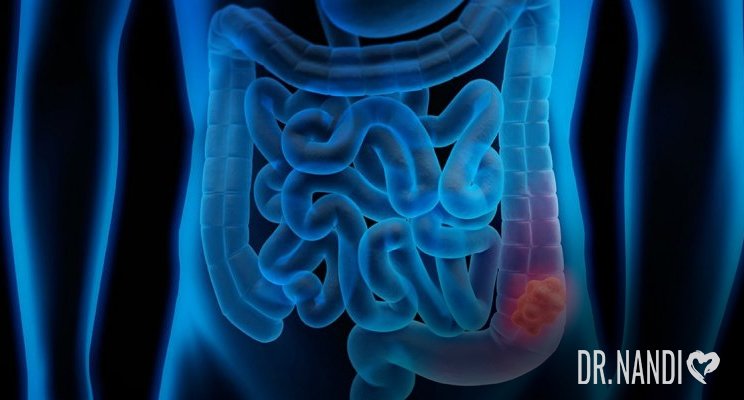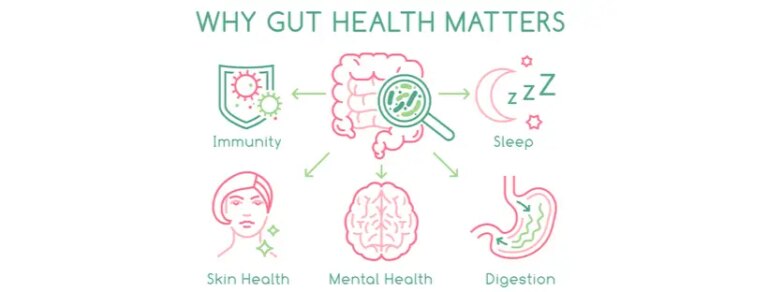An underlying health condition known as leaky gut causes damage to your gastrointestinal tract, allowing toxins to enter your bloodstream. A leaky gut compromises your digestive system and overall health, leading to unpleasant symptoms such as pain, fatigue, digestive issues, brain fog, and other health complications, such as mental health conditions, autoimmune disease, inflamed bowels, and cancer.
In this article, I want to discuss leaky gut syndrome in depth so you can have a greater understanding of the disease, how it affects the body, what you can do to treat it, and how to best work with your doctor to find healing and support.
A leaky gut syndrome is also known as ‘increased intestinal permeability.’ It is a condition with damaged cells in your small intestine lining. As a result, undigested food particles, bacteria, and toxic waste products can quickly ‘leak’ into your bloodstream.
Your gut is the most vulnerable part of your body to intruders as there is a one-cell layer between your digestive lining and your bloodstream.
Your gut is designed to take nutrients in from the food you eat for energy, healing, building blocks for cells, etc. It naturally absorbs specific vitamins, minerals, and micro-nutrients from natural foods. Anything else that enters the body is unrecognizable and labeled as such.
When you eat heavily processed foods, refined sugars, preservatives, and other unnatural ingredients, your body does not know what to do with them. If you eat it once or twice, there may not be any problems, but the body will act defensively and mount an inflammatory response when you eat it repeatedly.
As you continue to eat the foods, the inflammation will continue and slowly damage the cell layer of your intestinal lining.
On a microscopic level, your cells start to split apart and eventually leave gaps in your intestinal wall. When there are gaps in the intestinal barriers, foods can leak into your bloodstream undigested.
As these foreign and toxic substances enter your bloodstream, your body recognizes the problem and answers with an immune response, including inflammatory and allergic reactions, resulting in chronic fatigue syndrome, migraines, irritable bowel, eczema, and abdominal pain. In some cases of a leaky gut, your body often cannot have proper digestion. Your body may not absorb nutrients, your immune system weakens, and your hormones become imbalanced. (1)
Symptoms of Leaky Gut
Though you may think that leaky gut syndrome is all related to intestinal problems, this is not the case. A leaky gut can affect your entire body, and its signs are wide-ranging. (1)
- Pain
- Fatigue
- Nutritional deficiencies
- Weakened immune system
- Brain fog
- Memory trouble
- Chronic diarrhea or constipation
- Gas and bloating
- Skin breakouts, rashes, eczema, rosacea
- Mood disorders
- Intense cravings, especially for sugar and carbs
- Headaches
- Autoimmune disease (3)
- Joint pain and arthritis
- Thyroid conditions
- Fibromyalgia
- Acne
Will Leaky Gut Heal?
Leaky gut is a condition that you need to take as it can lead to many health issues down the road. The good news is that your intestinal lining can replace itself, and with proper treatment and lifestyle changes, you can recover from a leaky gut.
Are Leaky Gut And Irritable Bowel Syndrome (IBS) The Same Thing?
Though symptoms can be similar, IBS and Leaky Gut are not the same things. However, there is a connection between IBS and Leaky Gut. IBS is associated with inflammation in the gut and digestive disturbances. Over time this can damage the lining of your intestines and lead to Leaky Gut. On the other hand, your body develops a leaky gut first in some cases. Left untreated, it can lead to further damage and IBS symptoms. Which one comes rather can be difficult and sometimes impossible to tell. Healing these conditions requires the proper tests and diagnosis to develop a sound treatment plan. (2)
Complications of Leaky Gut Syndrome
Acne: It is more than just pimples; hair follicles are plugged with oil and dead skin cells. A gut flora imbalance can be the cause.
Constipation: Constipation is when you have trouble releasing your bowels regularly. About 4 million people in the US experience constipation. A leaky gut may be one of the reasons. (9)
Anemia: People with anemia do not have enough healthy red blood cells to carry adequate oxygen to the body’s tissues. It is usually a temporary and treatable condition. (10)
Headaches and Migraines: Most people have experienced headaches in their lives, and an increasing number of people are suffering from chronic headaches and migraines. The headaches can vary from stress, structural issues, food allergies, environmental triggers, bacteria overgrowth, Leaky Gut, and other issues.
Hives: Hives are skin rashes. They are triggered by irritants, including food, medication, etc. A leaky gut makes your system more compromised, and your body may react more harshly to irritants around you.
Depression/Anxiety: There is increasing evidence of the gut-brain connection. A gut flora imbalance and Leaky Gut can lead to depression, anxiety, and other mental health issues. (12)
Allergies: When you have a Leaky Gut, your body is compromised by becoming loaded with bad bugs and toxins, making you more susceptible to developing allergies.
Diarrhea: Diarrhea is associated with watery and loose stools and stomach pain. It can be caused by a gut flora imbalance and Leaky Gut.
Insomnia: Deficiencies in melatonin, which helps your sleep cycles, have been associated with a Leaky Gut. Your sleep-wake cycle is also affected by your gut health. (14)
Fertility/Infertility: About 10% of women of childbearing age have difficulty getting pregnant. Inflammation and Leaky Gut can be the hidden cause of some infertility cases. (15)
Brain Fog: If your gut health is compromised, bacteria in your system may release histamine, a substance that can lead to brain fog, a feeling of fogginess, lack of coordination, slowness, and slurred speech. (16)
Type 1 Diabetes: Research has found a connection between Type 1 Diabetes and a Leaky Gut affecting each other. (17)
Lupus: Leaky Gut makes your body more compromised and more susceptible to autoimmune conditions, such as Lupus. A leaky gut can also worsen your symptoms of autoimmune diseases. (18)
What Causes Leaky Gut Syndrome?
The four leading causes of the leaky gut syndrome include:
- An unhealthy diet
- Toxic overload
- Chronic Stress
- Bacterial imbalance
Let’s take a closer look.
Unhealthy diet
Generally speaking, your body needs healthy, whole foods, preferably organic, to function properly instead of processed foods with little nutrient value.
Proteins found in conventional dairy, sugar, un-sprouted grains, and GMOs are thought to be the most common culprit of damage to the intestinal barrier function and leaky gut. What is the issue with un-sprouted grains, you may wonder? They contain phytates and lectins. Lectins are sugar-binding proteins essential for plants to protect them from mold, parasites, and other invaders. However, while this is great for plants, it may not be that great for the human body, as lectins attach to your digestive lining and may cause damage. In small amounts, this can be okay. However, if you are eating a large amount of food containing lectins, such as rice, wheat, soy, and spelling, you may be in trouble. Sprouting and fermenting can reduce this issue, making these foods more gut-friendly.
Gluten is another compound that can lead to Leaky Gut in people with celiac disease or gluten sensitivity. For some, sticking with gluten-free foods is the best choice. (4)
Another protein that often leads to Leaky Gut and other health issues is A1 in cow’s milk. Conventional milk can be complicated for your body as the pasteurization process destroys enzymes essential for digestion. If you notice dairy causes digestive distress, consider buying raw milk from A2 cows, sheep, and goats.
Foods high in processed sugar can compromise your digestive system and lead to Leaky Gut. Harmful bacteria, yeast, and candida feed on sugar. It leads to an imbalance in your microbiome that can damage your intestinal wall.
Toxic Overload
The average person comes to contact with tens of thousands of chemicals and other toxic every year. Antibiotics, pesticides, tap water with fluoride and chlorine, aspirin, NSAIDs, steroids, smoking, and environmental pollution are common culprits. (5, 6) Sticking with organics, staying away from overusing medication, using natural products, filtering your water, and staying far from chemicals as much as possible is essential for your gut health.
Chronic Stress
If you are experiencing chronic stress in your life, your immune system weakens, making your body less able to fight off bacteria, viruses, and other invaders. And an overload of these bad bugs can lead to inflammation and a Leaky Gut. Taking care of yourself, sleeping and resting, reducing stress, adding more fun to your life, meditation, and good company is essential for your health. (7)
Dysbiosis
Dysbiosis is an imbalance between beneficial and harmful bacteria in your good. Eating probiotic and prebiotic-rich foods, a whole foods diet, avoiding the overuse of medication, and sticking with organic is necessary for creating balance again.
How To Treat Leaky Gut Syndrome
Diagnose Leaky Gut
The first step toward healing a leaky gut is identifying it.
Zonulin or Lactulose Tests
Zonulin is responsible for the opening size between your gut linings and bloodstream. In a healthy body, these openings are normal. In a compromised body, often due to gluten, yeast, candida, parasites, and harmful bacteria, zonulin levels become abnormally high, suggesting these openings are too large. Testing for zonulin levels is done with ELISA tests. Intestinal permeability assessment can also test for Leaky Gut by measuring how lactulose and mannitol, two sugar molecules, can permeate your gut lining. (19, 20)
IgG Food Intolerance Testing
By making your immune system work harder, a leaky gut can cause food sensitivities and food allergies. Many food intolerances and intolerances to gluten and pasteurized dairy can indicate Leaky Gut. (20)
Stool Tests
Stool tests check your beneficial bacteria levels and look at your overall intestinal immune function, intestinal health, inflammation markers, yeast, parasites, and other ‘bad bugs.’ (22)
Organic Acid Vitamin and Mineral Deficiencies Tests
Vitamin and mineral deficiencies and nutrient malabsorption are common warning signs of Leaky Gut and intestinal issues. Unabsorbed nutrients back your system up; they cannot help detoxify and damage your microvilli. Through urine, organic acid tests can look for vitamin, mineral, and amino acid deficiencies and bacteria levels to detect imbalance and help with supplementation and dietary changes. (23)
Lifestyle Treatments For Leaky Gut
Lifestyle treatments for Leaky Gut Include the 4 R-s:
- REMOVE foods and other substances that can damage your gut
- replace them with healthy foods
- repair with vitamins and supplements
- REBALANCE with probiotics
Step One: Remove foods and other substances that can damage your gut
It is essentially damage control. Remove processed sugars, food with additives, GMOs, and non-organic food. Keep a food journal, try an elimination diet, or get tested for food allergies and sensitivities. If you suspect a sensitivity, remove gluten and dairy and any foods you are allergic to or find potentially triggering an adverse reaction. Eliminate unnecessary medication, toxic products, and stress from your life. Consult your physician before reducing your medication.
Step Two: Replace them with healthy foods
Removing harm and triggers is essential but not enough. Adding healthy foods into your diet is where healing begins. Eat plenty of organic, whole foods: greens, vegetables, fruits, legumes, beans, nuts, and seeds.
Top foods that can help to heal your Leaky Gut:
- fermented vegetables
- sprouted seeds
- coconut products
- steamed veggies
- ghee
- ginger and turmeric
Besides adding healthy foods to your diet, it is essential to nourish your mind. You want to remove stress from your life as much as possible and replace it with stress-lowering, relaxing activities, including meditation, yoga, relaxation exercises, coloring, nature walks, art, dance, meaningful connections, positive thinking, and healthy sleep.
Step Three: Repair With Helpful Supplements
L-Glutamine: This essential amino acid supplement can help your body grow, repair your intestinal lining, and reduce inflammation.
Digestive enzymes: Taking digestive enzymes at the beginning of each meal can help your body fully digest your foods, so undigested particles cannot damage your gut.
Licorice Root: This herb can improve the acid production in your gut and balance your cortisol levels to lower emotional stress as a trigger for Leaky Gut.
Quercetin: This supplement supports the creation of tight junction proteins helping repair the intestinal lining.
Omega-3 Fatty Acids: Omega-3s in the form of fish oil or vegan algae oil can lower inflammation and help to rebuild your healthy cell walls.
Vitamin and Mineral Supplements: Temporary use of vitamin and mineral supplements can help with any deficiencies. Supplementation with Vitamin D3 is recommended long-term for everyone, and supplementation with B12 and magnesium may benefit most.
Step Four: Replenish With Probiotics
Probiotics are the most important supplements you can take for your gut health. They replenish good bacteria in your gut, crowding out harmful bacteria and creating balance in your microbiome. Besides probiotics, eat probiotic-rich foods, such as saurkraut, kimchi, kombucha, and kefir.
Which probiotics are best for Leaky gut?
When shopping for probiotics, saving money by buying cheap brands is no way. Buy high-quality brands with AT LEAST 50 billion units of probiotics per daily dose.
Post-Healing
After you are healed, maintain an 80/20 diet. Eat a healthy, whole foods diet 80% of the time, relax a bit, and eat less healthy 20% of the time. It is okay if 80/20 becomes 90/10 or more beneficial, but try not to make it 70/30 or let unhealthy habits sneak back in too much. Eat mindfully. Chew your food well. Continue to lower stress and add relaxing and uplifting activities to your life. You have worked hard for your health; you do not want to sacrifice it again.
Conventional Treatments for Leaky Gut
Conventional medicine does not recognize Leaky Gut as a condition. Treatment methods for symptoms usually include prescription medications that may mask the symptoms for a while. In some cases, these medications bring no results. In other cases, they seem to ease symptoms for a bit, then stop working. Long-term, they tend to contribute to the degrading intestinal lining. (24)
Frequently Asked Questions About Leaky Gut Syndrome
How Do I Know When My Leaky Gut Is Healed?
Your symptoms (or lack thereof) are the best indication of healing. When Leaky Gut is healed, your digestive issues decrease, food sensitivities go away, your skin clears up, you feel energetic in mind and body, your autoimmune labs improve, and you feel your optimal self again.
Is Leaky Gut an Autoimmune Disease?
No, but there is a connection between the two. A leaky gut can lead to autoimmune disease, and healing a leaky gut can improve your autoimmune symptoms.
Is Leaky Gut Celiac Disease?
They are not, but untreated celiac disease can lead to Leaky Gut.
How Can Doctors Treat Leaky Gut Syndrome?
Functional medicine, integrative medicine, holistic medicine, naturopathic, and some traditional doctors are your best choices for seeking treatment for Leaky Gut.
Will Leaky Gut Heal on Its Own?
If you continue living the same lifestyle that has contributed to a leaky gut, such as an unhealthy diet, stress, and loads of medication, your leaky gut will not magically disappear. By changing your lifestyle and adopting a leaky gut diet with the help of your doctor, such as eating a healthy whole foods diet, staying away from processed foods, reducing toxins, de-stressing, and taking probiotics, your body can begin to heal itself.
Can a Leaky Gut Cause Hair Loss?
Yes, leaky gut symptoms may include hair loss.
What Is Leaky Gut in Babies?
All babies are born with a Leaky Gut. In their case, this is healthy and natural, so they can fully benefit from the nourishment of their mother’s colostrum. Soon after birth, however, the gut lining starts to connect and thicken to place an essential barrier needed for life outside with solid food.
Are Leaky Gut and Candida Related?
Candida is naturally present in your body. An unhealthy diet of processed sugar and processed foods and overuse of antibiotics can lead to candida overgrowth that can cause digestive issues and a Leaky Gut.
Is Leaky Gut Common in People With Autism?
Leaky Gut is ubiquitous in those with autism; 9 out of 10 suffer from a gastrointestinal issue, including Leaky Gut. Though some believe that a Leaky Gut can worsen the symptoms of autism, there is no clear scientific evidence at this point. (8)
Conclusion
If you think you might have Leaky Gut, I suggest scheduling an appointment with your healthcare professional.
You will create the best results in your life and health goals if you commit to being your own #HealthHero. It means that you are committed to your well-being and will do what it takes to live a life of health and vitality. When you feel your best, you can make the most impact in the lives of those you love and in the community you live in.
Did you find the information in the post helpful? What other conditions would you be interested in learning about on our blog? Please comment below.
References:
- Chronic Inflammation: Causes, Symptoms and Treatment – Ask Dr. Nandi | Official Site (askdrnandi.com)
- A BRIEF EVIDENCE-BASED REVIEW OF TWO GASTROINTESTINAL ILLNESSES: IRRITABLE BOWEL AND LEAKY GUT SYNDROMES – ProQuest
- Leaky gut and autoimmune diseases – PubMed (nih.gov)
- Gliadin, zonulin and gut permeability: Effects on celiac and non-celiac intestinal mucosa and intestinal cell lines – PubMed (nih.gov)
- Prevention and management of non-steroidal anti-inflammatory drugs-induced small intestinal injury (wjgnet.com)
- Zinc carnosine, a health food supplement that stabilises small bowel integrity and stimulates gut repair processes – PMC (nih.gov)
- Zinc carnosine, a health food supplement that stabilises small bowel integrity and stimulates gut repair processes – PMC (jpp.krakow.pl)
- Zinc carnosine, a health food supplement that stabilises small bowel integrity and stimulates gut repair processes – PMC (scientificamerican.com)
- Epidemiology of constipation in the United States – PubMed (nih.gov)
- Anemia – Symptoms and causes – Mayo Clinic
- The gut-brain connection – Harvard Health
- Human Verification (sciencedaily.com)
- Unlocking the Sleep-Gut Connection | HuffPost Life
- Infertility | Office on Women’s Health (womenshealth.gov)
- How Your Gut Causes Brain Fog and How to Fix It (drruscio.com)
- The “Perfect Storm” for Type 1 Diabetes – PMC (nih.gov)
- Leaky Gut As a Danger Signal for Autoimmune Diseases – PMC (nih.gov)
- Intestinal Permeability and its Regulation by Zonulin: Diagnostic and Therapeutic Implications – PMC (nih.gov)
- ELISA Test Steps, Results, 4 Types & Risks (medicinenet.com)
- Comprehensive Stool Analysis — Great Plains Laboratory
- Organic Acids Test (OAT Urine Test) – Holistic Help






















